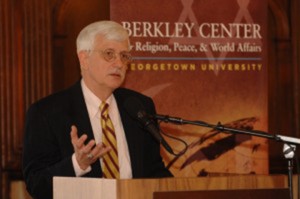
Reporter
U.S. foreign policy failures and indifference to those who suffer for their religious convictions are the topic of discussion 3 p.m. Monday at Kayser Auditorium.
Dr. Thomas F. Farr, Georgetown University’s Berkley Center for Religion, Peace and World Affairs, will talk to Baylor students and faculty about failures of U.S. foreign policy and what he called a “crisis of religious liberty.” He directs the Religious Freedom Project and the Program on Religion and U.S. Foreign Policy at the Berkley Center.
Baylor’s Institute for Studies of Religion will host Farr’s presentation about the Christian and American responsibility to religious liberty and what that means to global policy. Registration for the event is free and a link to sign up is on the institute’s website.
“I will sketch out the dimensions of a global crisis in religious liberty,” Farr said in an email to the Lariat. “That entails violent persecution outside the West, and a decline of religious freedom and public Christian witness inside the West, including in the United States.”
Farr said his key argument holds the implications of such crises are important to the health of American democracy and the fate of societies ravaged by “religion-related violence and terrorism.”
Dr. Byron Johnson, founding director of the the Institute for Studies of Religion, said Farr is one of the leading voices in the academy dealing with religious liberty.
“My big concern is that maybe people don’t know that religious liberty and freedom are, in fact, eroding,” Johnson said. “His talk will be an asset to students and faculty.”
Farr is a visiting associate professor of religion and international affairs at the Edmund A. Walsh School of Foreign Service at Georgetown. In the past, he’s taught history and international relations at the U.S Military Academy in West Point and the U.S. Air Force Academy in Colorado Springs.
His work in international relations at Geneva helped to develop the nation’s strategic nuclear policy during the Cold War.
Johnson said Farr’s address is recognition of the growing collaboration between the two centers on such important issues as religion and foreign affairs.
Farr was first to be appointed director of the state department’s Office of International Religious Freedom in 1999.
“The world is, for better or worse, a highly religious place,” Farr said in the email. “It is unfortunate that American diplomacy has in recent decades become highly secular and indifferent to the reality that religious actors are having an enormous impact on domestic and international affairs.”






